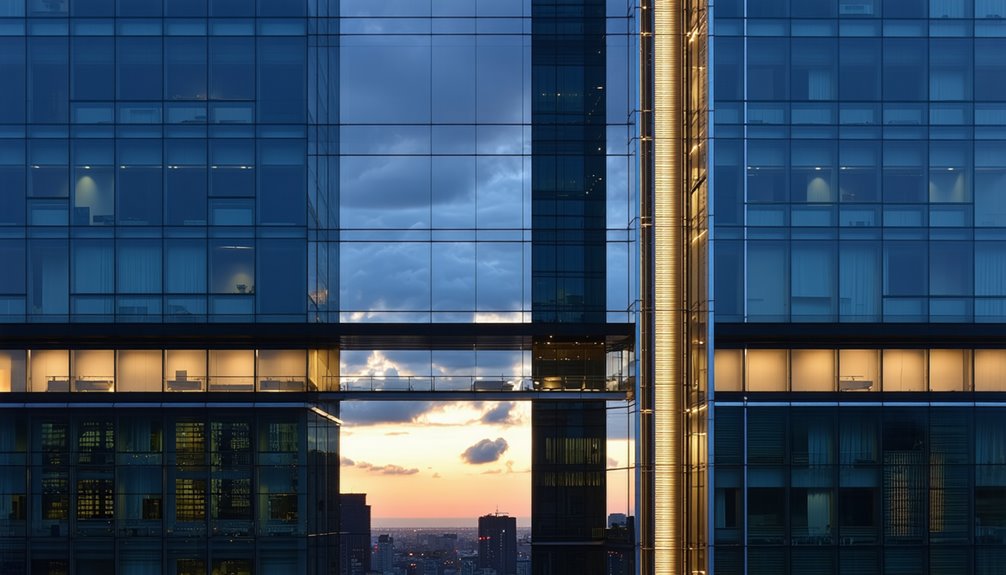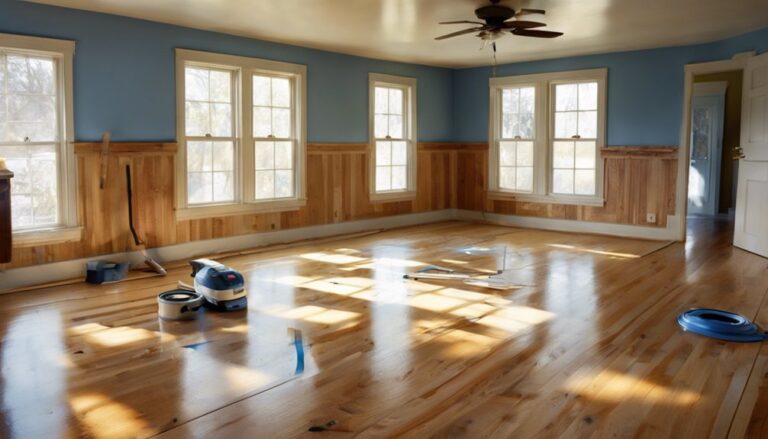Many hotels skip the 13th floor entirely, thanks to superstitions surrounding the number. This cultural belief, known as triskaidekaphobia, suggests that 13 brings bad luck, which has historical roots in various societies. To accommodate these fears, hotels often label the 13th floor as the 14th or use alternative names like "12A" or "Sky Level." This thoughtful design choice enhances guest comfort and creates a welcoming atmosphere. If you find this interesting, you'll soon discover more about the variety of ways hotels handle this quirky tradition and the unique experiences it can create for travelers like you.
The Origin of the 13th Floor

Although you might not think twice about it, the absence of a 13th floor in many hotels and buildings has deep historical roots. This architectural quirk reflects the historical significance of the number 13, often shunned due to its association with urban legends of bad luck. In the past, many cultures viewed the number as ominous, linking it to misfortune and tragedy. As a result, builders began skipping the 13th floor in an effort to appease potential tenants and guests who might feel uneasy about staying there. This practice not only shaped urban landscapes but also reflects our collective psyche, balancing the desire for modernity with deep-seated fears. The legacy of this decision continues to influence architectural choices today.
Superstitions Around the Number 13
While some may dismiss it as mere superstition, the fear of the number 13—known as triskaidekaphobia—has permeated various cultures throughout history. Its origins can be traced back to ancient societies, where the number 12 represented completeness, making 13 an unsettling outlier. Historically, this belief gained traction with events like the Last Supper, where Judas, the betrayer, was the 13th guest. Such narratives have created a lasting stigma around the number, influencing everything from calendars to hotel room designs. You've likely noticed buildings skip the 13th floor, a nod to this deep-rooted anxiety. Embracing the freedom to challenge these superstitions can help you rethink the significance of this number, turning fear into curiosity about its historical significance.
Architectural Responses to Superstition

The impact of triskaidekaphobia on architectural design is evident in how buildings are constructed, particularly in urban environments. You'll find that many skyscrapers skip the 13th floor, labeling it as 14 instead. This practice reflects superstitious architecture that caters to the fears of potential guests. It's not just about avoiding discomfort; it's also about cultural symbolism. Architects often consider these beliefs, shaping spaces that resonate with the community's values and fears. By omitting the number 13, they create an environment that feels safer and more welcoming. This response to superstition is a fascinating dance between design and belief, allowing you to enjoy spaces that reflect both modern aesthetics and age-old fears.
Cultural Differences in Floor Numbering
When you check into a hotel, you might notice that floor numbering varies across cultures, influenced by local superstitions and beliefs. In some places, the number 4 is avoided because it sounds like the word for "death," while others might skip the 13th floor entirely. Understanding these regional naming conventions can give you insight into architectural choices and the cultural nuances behind them.
Superstitions and Beliefs
In many cultures, the number 13 carries an air of superstition, leading to unique practices like omitting it from hotel floor numbering. This superstition impacts hotel myths, causing many establishments to skip the 13th floor entirely.
| Cultural Beliefs | Impact on Hotels |
|---|---|
| 13 as unlucky | Omission of the 13th floor |
| 4 considered unlucky | Floors labeled 3A instead |
| 17's negativity in Italy | 16th floor used instead |
You might find that in some buildings, the 14th floor is actually the 13th. It's fascinating how these beliefs shape our experiences, showing how deeply rooted superstitions can influence design and architecture around the world.
Regional Naming Conventions
Building design often reflects cultural beliefs, leading to fascinating regional naming conventions in floor numbering. You might notice in some Asian countries, the number four is avoided due to its association with death, prompting hotels to skip this digit entirely. Instead, they'll jump from three to five, showcasing significant regional differences in naming practices. In contrast, Western hotels often eliminate the 13th floor, embracing the superstition surrounding that number. This variation highlights how cultural contexts shape our everyday experiences. Next time you enter a hotel, take a moment to appreciate these unique naming practices. It's a reflection of how deeply culture influences even the most mundane aspects of our lives, adding layers of meaning to our journeys.
Architectural Considerations
While many might not think twice about floor numbering, architectural considerations reveal how deeply cultural beliefs influence design choices. In some cultures, the number 13 is associated with bad luck, prompting architects to eliminate or rename the 13th floor to enhance design aesthetics and appeal to guests' sensibilities. This decision can have structural implications, as the layout may require creative solutions to maintain the building's integrity while accommodating these cultural preferences. For instance, some hotels may skip the number entirely, instead labeling the 12th floor as the 14th. Understanding these nuances not only highlights the intersection of culture and architecture but also demonstrates how design choices can shape a space's atmosphere, making it more inviting for visitors from diverse backgrounds.
The Impact on Hotel Design

When designing a hotel, cultural beliefs can greatly shape how floors are numbered and organized. You might notice that some buildings skip the 13th floor entirely or use alternatives like labeling it as the 14th. Additionally, elevator configurations often change to accommodate these choices, ensuring guests feel comfortable and at ease during their stay.
Cultural Beliefs Influence Design
Cultural beliefs considerably shape hotel design, influencing everything from architecture to room layouts. Designers often consider cultural symbolism and design preferences to create spaces that resonate with their guests. Here are a few ways these beliefs influence hotel design:
- Flooring Choices: Certain materials are favored based on cultural significance.
- Room Configurations: Open spaces might be preferred in some cultures to foster community.
- Decor Elements: Artwork and color schemes often reflect local traditions and values.
Floor Numbering Alternatives
Many hotels opt for creative floor numbering alternatives to accommodate guests' beliefs and superstitions, particularly regarding the number 13. This approach not only enhances guest comfort but also reflects a keen understanding of the psychological impact of floor labeling. By renumbering or skipping certain floors, hotels create an inviting atmosphere that respects individual perceptions.
Here's a glimpse into common floor labeling alternatives:
| Floor Labeling | Psychological Impact | Guest Preference |
|---|---|---|
| 12th Floor | Reduces anxiety | Higher satisfaction |
| 14th Floor | Promotes positivity | Increased bookings |
| 20th Floor | Builds confidence | Enhanced experience |
| 21st Floor | Encourages exploration | Greater loyalty |
These thoughtful changes can transform a hotel's design, making it more appealing and free-spirited for guests.
Elevator Configuration Changes
Hotels not only modify floor numbering to accommodate superstitions but also rethink elevator configurations to enhance guest experience. Effective elevator design can drastically transform how you navigate a hotel, making your stay more enjoyable.
Consider these aspects of elevator configurations:
- Express Elevators: Direct access to popular floors cuts waiting time.
- Zoned Elevators: Groups floors together, creating a smoother flow for guests.
- Smart Controls: Technology that learns patterns can optimize your ride.
These thoughtful changes in floor labeling and elevator design reflect a commitment to guest comfort. By prioritizing efficient movement throughout the hotel, you're less likely to feel the stress of travel, allowing you the freedom to truly unwind.
Travelers' Reactions to the Missing Floor
Why do so many travelers find themselves taken aback when they discover a hotel skips the 13th floor? For many, it's a jarring moment that challenges their expectations. This missing floor can shift traveler perceptions, prompting questions about superstition and design choices. You might wonder if there's something more to it than just a quirky quirk. Some feel uneasy, while others simply chuckle, sharing anecdotes about their unique hotel experiences. This curious phenomenon often sparks conversation among guests, bridging the gap between cultures and beliefs. Embracing the unexpected, travelers appreciate the freedom to explore these oddities, leading to deeper connections with each other and the places they visit. After all, every detail adds to the adventure.
Case Studies of Notable Hotels

While it may seem like a minor architectural choice, the absence of a 13th floor in some famous hotels often reflects deeper cultural beliefs and marketing strategies. You might be surprised to learn that several hotel examples skip this number entirely, prioritizing guest comfort and preferences.
Consider these notable cases:
- The Hilton: Many locations omit the 13th floor, catering to superstitions around bad luck.
- The Marriott: Similar practices are common, with floor numbering adjusted for cultural sensitivities.
- The Ritz-Carlton: Their luxury branding often leads to avoiding the 13th floor to appeal to all guests.
These choices illustrate how floor numbering can influence perceptions and experiences in the hospitality industry, shaping the way you view your hotel stay.
Alternatives to the 13th Floor
Many hotels have found creative solutions to sidestep the superstition surrounding the number 13, opting for alternative floor designations that maintain a sense of normalcy for guests. Instead of labeling the 13th floor, some establishments use superstitious alternatives like "12A" or "14" to give the illusion of a seamless sequence. Others embrace creative naming, calling it "Sky Level" or even "Penthouse." This not only alleviates any discomfort for the superstitious but also adds a unique charm to the hotel's ambiance. By reimagining the floor numbering, hotels can create a welcoming environment, allowing you to feel at ease as you explore the amenities without the weight of superstition hanging overhead. Freedom from fear makes every stay more enjoyable!
Frequently Asked Questions
Are There Hotels That Embrace the 13TH Floor Instead of Avoiding It?
Absolutely, there are hotels that embrace 13th floor acceptance, showcasing unique hotel design choices. These establishments often aim to break the superstition surrounding the number, inviting guests to experience the full height of their buildings. By incorporating the 13th floor, they challenge traditional beliefs, promoting a sense of freedom and openness. Staying on this level can even feel like a bold statement, allowing you to enjoy stunning views without any stigma attached.
How Do Hotel Guests Perceive the Absence of a 13TH Floor?
When you notice the absence of a 13th floor in a hotel, your guest perceptions might vary. Some might find it quirky or superstitious, influenced by cultural beliefs that associate the number with bad luck. Others could see it as a marketing tactic, giving them a sense of intrigue. This avoidance can evoke feelings of freedom or unease, depending on your perspective, reflecting how cultural influences shape our experiences in unfamiliar spaces.
Do Other Countries Have Similar Superstitions About Certain Floor Numbers?
You'll find that many countries share similar superstitions about certain floor numbers, reflecting diverse cultural beliefs. In some East Asian cultures, the number four is often avoided due to its association with death, leading to buildings skipping that floor. Conversely, in Italy, the number 17 holds negative connotations. These international practices reveal how deeply rooted traditions can influence architecture and design, showcasing the fascinating interplay between culture and everyday life.
Are There Any Psychological Effects Associated With the Missing 13TH Floor?
The missing 13th floor can have a significant psychological impact on people. Many individuals may not even realize it, but superstition beliefs surrounding the number 13 can evoke feelings of unease. This can influence their experience in a building, leading to heightened anxiety or discomfort. By omitting the 13th floor, hotels aim to create a more inviting atmosphere, catering to those who might feel apprehensive about staying in a place associated with bad luck.
What Are Some Myths Surrounding Hotels With a 13TH Floor?
When it comes to hotels having a 13th floor, you'll find plenty of myths tied to floor superstitions and cultural beliefs. Many people believe that the number 13 brings bad luck, leading some hotels to skip the floor altogether. Others think that staying on the 13th floor invites misfortune or supernatural occurrences. These tales can add an air of mystery, but remember, it's just a number—your experience is what truly matters!




